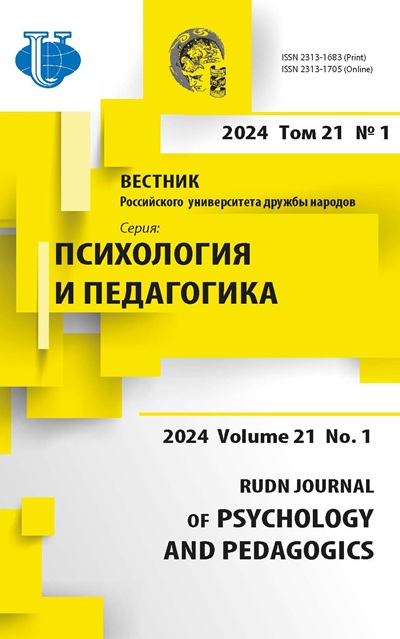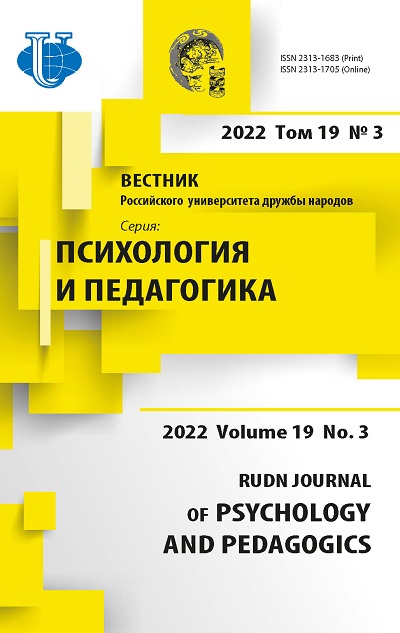Development of a Measure for Assessing Perceived Community Culture Based on Triandis’s Horizontal/Vertical Individualism-Collectivism Cultural Orientation
- Authors: Gallyamova A.A.1, Grigoryev D.S.1
-
Affiliations:
- HSE University
- Issue: Vol 19, No 3 (2022)
- Pages: 429-447
- Section: PERSONALITY IN INTERCULTURAL COMMUNICATION
- URL: https://journals.rudn.ru/psychology-pedagogics/article/view/32241
- DOI: https://doi.org/10.22363/2313-1683-2022-19-3-429-447
Cite item
Full Text
Abstract
A new measure based on Triandis’s horizontal/vertical individualism-collectivism cultural orientation was developed to assess perceived community culture though the lens of horizontal individualism, vertical individualism, horizontal collectivism, and vertical collectivism. In the first step, a qualitative analysis using cognitive interviews showed that item wordings were appropriate to the Russian context, meaningfully accurate, and tangible to participants. In the second step, there was empirical testing of measure with 300 participants of the sociopsychological survey (questionnaire). The results showed that the expected factor structure had acceptable global and local fit of measurement model with the collected data. The measures had measurement equivalence by gender and acceptable indicators of reliability and validity. Comparison of obtained results with those published earlier showed that presented measure of the cultural orientations provided better model fit and indicators than the original measure or its other modifications, adaptations, and translations into Russian. Moreover, the developed measure showed that the assessment results were meaningfully correlated with the individual values of the participants assessed by Schwartz’s basic human values approach. Finally, the measure is particularly useful and can be successfully applied in a variety of studies aimed to study social influence. The questionnaire in English is available at Appendix in the end of the paper.
About the authors
Albina Alikovna Gallyamova
HSE University
Author for correspondence.
Email: aagallyamova@hse.ru
ORCID iD: 0000-0002-8775-7289
Research Intern, Center for Sociocultural Research
20 Myasnitskaya St, Moscow, 101000, Russian FederationDmitry Sergeevich Grigoryev
HSE University
Email: dgrigoryev@hse.ru
ORCID iD: 0000-0003-4511-7942
PhD, Research Fellow, Center for Sociocultural Research
20 Myasnitskaya St, Moscow, 101000, Russian FederationReferences
- Agadullina, E.R., Ivanov, A.A., Sarieva, I.R., & Prusova, I.S. (2021). System justification theory: A new perspective on the problem of inequality. Journal of Modern Foreign Psychology, 10(1), 132-141. (In Russ.) https://doi.org/10.17759/jmfp.2021100113
- Berry, J.W. (2019). Ecocultural psychology (D. Grigoryev, Transl.). Cultural-Historical Psychology, 15(4), 4-16. (In Russ.) https://doi.org/10.17759/chp.2019150401
- Echterhoff, G., Kopietz, R., & Higgins, E.T. (2013). Adjusting shared reality: Communicators’ memory changes as their connection with their audience changes. Social Cognition, 31(2), 162-186. https://doi.org/10.1521/soco.2013.31.2.162
- Efremova, M., Panyusheva, T., Schmidt, P., & Zercher, F. (2017). Mixed methods in value research: An analysis of the validity of the Russian version of the Schwartz Value Survey (SVS) using cognitive interviews, multidimensional scaling (MDS), and confirmatory factor analysis (CFA). Ask: Research and Methods, 26(1), 3-30. https://doi.org/10.18061/1811/81933
- Fornell, C., & Larcker, D.F. (1981). Evaluating structural equation models with unobservable variables and measurement error. Journal of Marketing Research, 18(1), 39-50. https://doi.org/10.2307/3151312
- Henseler, J., Ringle, C.M., & Sarstedt, M. (2015). A new criterion for assessing discriminant validity in variance-based structural equation modeling. Journal of the Academy of Marketing Science, 43(1), 115-135. https://doi.org/10.1007/s11747-014-0403-8
- Hofstede, G. (2011). Dimensionalizing cultures: The Hofstede model in context. Online Readings in Psychology and Culture, 2(1), 8. https://doi.org/10.9707/2307-0919.1014
- Inglehart, R.F. (2008). Changing values among Western publics from 1970 to 2006. West European Politics, 31(1-2), 130-146. https://doi.org/10.1080/01402380701834747
- Inglehart, R.F., & Baker, W.E. (2000). Modernization, cultural change, and the persistence of traditional values. American Sociological Review, 65(1), 19-51. https://doi.org/10.2307/2657288
- Jost, J.T., Becker, J., Osborne, D., & Badaan, V. (2017). Missing in (collective) action: Ideology, system justification, and the motivational antecedents of two types of protest behavior. Current Directions in Psychological Science, 26(2), 99-108. https://doi.org/10.1177/0963721417690633
- Kline, R.B. (2010). Principles and practice of structural equation modeling (3rd ed.). New York: Guilford Press
- Kryukova, T.L. (2013) Sociocultural syndromes of collectivism vs. individualism as coping research context in Russians. Vestnik Kostromskogo Gosudarstvennogo Universiteta Imeni N.A. Nekrasova. Seriya: Pedagogika. Psihologiya. Sotsial'naya rabota. Yuvenologiya. Sociokinetika, 19(4), 130-134. (In Russ.)
- Kyriazos, T.A. (2018). Applied psychometrics: Sample size and sample power considerations in factor analysis (EFA, CFA) and SEM in General. Psychology, 9(8), 2207-2230. https://doi.org/10.4236/psych.2018.98126
- Lebedeva, N.M., & Tatarko, A.N. (2007). Cultural values and social development. Moscow: Higher School of Economics Publishing House. (In Russ.)
- Lebedeva, N.M., Chirkov, V.I., & Tatarko, A.N. (2007). Culture and attitude to health: Russia, Canada, China. Moscow: RUDN University. (In Russ.)
- Mai, R., Niemand, T., & Kraus, S. (2021). A tailored-fit model evaluation strategy for better decisions about structural equation models. Technological Forecasting and Social Change, 173, 121142. https://doi.org/10.1016/j.techfore.2021.121142
- Muminova A.M., Titov A.S., Batkhina A.A., & Grigoryev D.S. (2022). Russian political identity profiles: The role of moral foundations, system justification, and resistance to change. Social Psychology and Society, 13(1), pp. 104-123. (In Russ.) https://doi.org/10.17759/sps.2022130107
- Nartova-Bochaver, S.K. (2019). Human environments as a source of stress and a resource to overcome it: Returning to the psychology of everyday life. Psikhologicheskii Zhurnal, 40(5), 15-26. (In Russ.) https://doi.org/10.31857/S020595920006072-5
- Pankratova А.A., Osin Е.N., & Hasanova, U.U. (2017). Levels of horizontal and vertical individualism and collectivism in Russia and Azerbaijan. Psychological Studies, 10(55), 3. (In Russ.) https://doi.org/10.54359/ps.v10i55.352
- Ponizovskiy, V., Arant, R., Larsen, M., & Boehnke, K. (2020). Sticking to common values: Neighbourhood social cohesion moderates the effect of value congruence on life satisfaction. Journal of Community & Applied Social Psychology, 30(5), 530-546. https://doi.org/10.1002/casp.2457
- Rentfrow, P.J., Gosling, S.D., & Potter, J. (2008). A theory of the emergence, persistence, and expression of geographic variation in psychological characteristics. Perspectives on Psychological Science, 3(5), 339-369. https://doi.org/10.1111/j.1745-6924.2008.00084.x
- Saris, W.E., Satorra, A., & van der Veld, W.M. (2009). Testing structural equation models or detection of misspecifications? Structural Equation Modeling: A Multidisciplinary Journal, 16(4), 561-582. https://doi.org/10.1080/10705510903203433
- Schwartz, S. (2006). A theory of cultural value orientations: Explication and applications. Comparative Sociology, 5(2-3), 137-182. https://doi.org/10.1163/156913306778667357
- Schwartz, S.H. (1992). Universals in the content and structure of values: Theoretical advances and empirical tests in 20 countries. In M.P. Zanna (Ed.), Advances in Experimental Social Psychology (vol. 25, pp. 1-65). New York: Academic Press. https://doi.org/10.1016/S0065-2601(08)60281-6
- Schwartz, S.H., & Ros, M. (1995). Values in the West: A theoretical and empirical challenge to the individualism-collectivism cultural dimension. World Psychology, 1, 91-122
- Singelis, T.M., Triandis, H.C., Bhawuk, D.P.S., & Gelfand, M.J. (1995). Horizontal and vertical dimensions of individualism and collectivism: A theoretical and measurement refinement. Cross-Cultural Research, 29(3), 240-275. https://doi.org/10.1177/106939719502900302
- Sirganci, G., Uyumaz, G., & Yandi, A. (2020). Measurement invariance testing with alignment method: Many groups comparison. International Journal of Assessment Tools in Education, 7(4), 657-673. https://doi.org/10.21449/ijate.714218
- Sivadas, E., Bruvold, N.T., & Nelson, M.R. (2008). A reduced version of the horizontal and vertical individualism and collectivism scale: A four-country assessment. Journal of Business Research, 61(3), 201-210. https://doi.org/10.1016/j.jbusres.2007.06.016
- Smith, P.B., & Bond, M.H. (2019). Cultures and persons: Characterizing national and other types of cultural difference can also aid our understanding and prediction of individual variability. Frontiers in Psychology, 10, 2689. https://doi.org/10.3389/fpsyg.2019.02689
- Tehrani, D.H., & Yamini, S. (2022). Gender differences concerning the horizontal and vertical individualism and collectivism: A meta-analysis. Psychological Studies, 67(1), 11-27. https://doi.org/10.1007/s12646-022-00638-x
- Triandis, H.C. (1996). The psychological measurement of cultural syndromes. American Psychologist, 51(4), 407-415. https://doi.org/10.1037/0003-066x.51.4.407
- Triandis, H.C. (2001). Individualism-collectivism and personality. Journal of Personality, 69(6), 907-924. https://doi.org/10.1111/1467-6494.696169
- Triandis, H.C., & Gelfand, M.J. (1998). Converging measurement of horizontal and vertical individualism and collectivism. Journal of Personality and Social Psychology, 74(1), 118-128. https://doi.org/10.1037/0022-3514.74.1.118
- van de Schoot, R., Lugtig, P., & Hox, J. (2012). A checklist for testing measurement invariance. European Journal of Developmental Psychology, 9(4), 486-492. https://doi.org/10.1080/17405629.2012.686740
- Vargas, J.H., & Kemmelmeier, M. (2013). Ethnicity and contemporary American culture: A meta-analytic investigation of horizontal - vertical individualism-collectivism. Journal of Cross-Cultural Psychology, 44(2), 195-222. https://doi.org/10.1177/0022022112443733
















